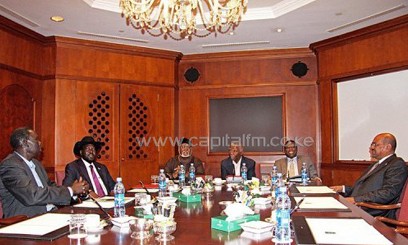
They also follow intensive talks between South Sudan’s chief negotiator Pagan Amum and senior Sudanese government officials in Khartoum to find a positive atmosphere that helps the two sides to overcome their differences/FILE
The meetings of the committee come after the two sides have so far failed to implement the comprehensive cooperation deal, namely with regard to its security part relating to border demarcation, deployment of troops on a buffer zone and breaking the link between South Sudan’s army and armed groups fighting the government in Khartoum.
They also follow intensive talks between South Sudan’s chief negotiator Pagan Amum and senior Sudanese government officials in Khartoum to find a positive atmosphere that helps the two sides to overcome their differences over the oil file which slowed down the implementation of the deal.
Sudanese observers regard the committee’s meetings in Khartoum as the last opportunity to achieve a breakthrough in the outstanding issues which threaten the understandings reached by the two sides in the Ethiopian capital Addis Ababa.
“The recent moves by Sudan and South Sudan represent a positive step to boost the two countries’ ties and build good neighborliness relations between them,” Mahmoud Ali, a Sudanese political analyst, told Xinhua.
“In my view point, I believe Khartoum meetings constitute a last chance for overcoming the barriers and the state of distrust which appeared following the signing of the cooperation agreement in Addis Ababa. The two sides should reach understandings to speed up the implementation of the deal,” he said.
Ali further expressed optimism over the visit of the South Sudan delegation to Khartoum, noting that the two sides are in great need for good neighbor relations to achieve their common interests.
“The two sides are now more serious than before after they realized that inflexibility regarding some issues of difference would not serve the interests of the two countries. I think both side are now maintaining the political will to implement the agreement,” he said.
Meanwhile, Rabie Abdul-Atti, a leading member of the ruling National Congress Party (NCP), told Xinhua that “I think the visit of South Sudan’s chief negotiator to Khartoum and the beginning of the meetings of the joint political and security committee constitute an important phase in settling the differences.
He said he hopes the meetings of the committee will mark a real beginning for the implementation of the deal, but stressed the importance for the Sudan People’s Liberation Movement (SPLM) of South Sudan to break the link with the SPLM/northern sector.
The security arrangements, namely with regard to breaking the link between South Sudan’s army and the fighters of the SPLM/ northern sector, constitutes a major barrier facing the meetings of the joint political and security committee.
Khartoum is demanding Juba to demobilize all the northern troops within the Sudan People’s Liberation Army (SPLA) in South Sudan, including those from South Kordofan and Blue Nile areas.
On September 27, Sudan and South Sudan signed a package of agreements on various issues during a presidential summit in the capital of Ethiopia.
Witnessed by members of the African Union High-Level Implementation Panel on Sudan (AUHIP), the two sides inked three deals on cooperation, security and post-secession matters.
South Sudan was expected to resume the pumping of its oil and export it through Sudan’s territories by mid-December, but the process has not started as Sudan adheres to its stance that it will not allow South Sudan’s oil to pass through its territories until the security issues between the two sides are settled.
In January this year, South Sudan halted exportation of its oil through Sudan’s territories after the tension mounted between the two sides over fees of exporting the south’s oil via Sudan’s pipeline.









































